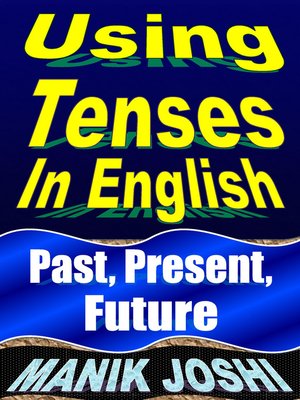
Sign up to save your library
With an OverDrive account, you can save your favorite libraries for at-a-glance information about availability. Find out more about OverDrive accounts.
Find this title in Libby, the library reading app by OverDrive.



Search for a digital library with this title
Title found at these libraries:
| Library Name | Distance |
|---|---|
| Loading... |
This Book Covers The Following Topics:
What are "Tenses"?
AGREEMENT between SUBJECT and VERB
TWENTY-FOUR Auxiliary Verbs
REGULAR AND IRREGULAR VERBS
PRESENT TENSE
Present Indefinite Tense
Present Continuous/Progressive Tense
Present Perfect Tense
Present Perfect Continuous/Progressive Tense
PAST TENSE
Past Indefinite Tense
Past Continuous/Progressive Tense
Past Perfect Tense
Past Perfect Continuous/Progressive Tense
FUTURE TENSE
Future Indefinite Tense
Future Continuous/Progressive Tense
Future Perfect Tense
Future Perfect Continuous/Progressive Tense
Useful Notes
Exercises
Sample This:
Tenses could be defined as "any of the form of a verb that may be used to show the time of the action or an event or state expressed by the verb".
THERE ARE THREE KINDS OF TENSES:
The Past Tense – The form of a verb that usually expresses an action that happened in the past
[Action happened before present]
The Present Tense – The form of a verb that usually expresses an action that happens at this time
[Action happens in present]
The Future Tense – The form of a verb that usually expresses an action that will happen in future
[Action will happen after present]
EACH OF THESE THREE KINDS OF SENTENCES HAS FOUR TYPES OF FORMS:
Indefinite or Simple Form
Continuous or Progressive Form
Perfect Form
Perfect Continuous or Perfect Progressive Form
EACH OF THESE FOUR TYPES OF FORMS HAS FOUR KINDS OF STATEMENTS:
Affirmative Statement —
Used to Show 'Agreement'
Negative Statement —
Used to Show 'Disagreement'
Interrogative Statement —
Used to Ask 'Question'
Interrogative-Negative Statement —
Used to Ask 'Question' and Show 'Disagreement'
Present Indefinite Tense
Expresses –
Permanent situation [in the past, present and future]
Example: Our family lives in Seattle.
General truth (fact or statement)
Example: Clean water is fundamental to public health.
Example: Many barrages have no utility and cause floods.
Habitual action [actions that occur regularly]
Example: She listens to music every day.
'Future meaning' (timetable, planned event, etc.)
Example: My shop closes at 9 pm.
Example: The train arrives at 7:30 pm.
Traditions, rituals, customs
Example: Indians celebrate the festival of light in the month of Oct-Nov.
Commands and Instructions [Imperative Sentences]
[Note: In imperatives, subject 'you' remains hidden]
Example: Condemn perpetrators of terrorism.
Example: Promote values of humanity and tolerance.
Example: Tell us about the exact nature of your work.
Used in if-clause of present and future real conditional sentences
Example: If I go there, I meet him.
Example: If things don't work out, we won't be panicked.
Headlines in news reporting [Use of simple present tense instead of the simple past tense is common in news headlines]
Example: Flight skids on landing at the airport.
Example: Thunderstorm brings relief to residents.
(A). AFFIRMATIVE PATTERN –
subject + first form of main verb + other words
Singular Verb is used with the subject 'He and She' + All Singular Subjects.
Plural Verb is used with the subject 'I, We, You and They' + All Plural Subjects.
Examples:
He/She talks. I/We/You/They talk.
We seek opportunities to chart out our own course.
The lean margin of victory or defeat gives an impression of a tough contest.
Nowadays,...







